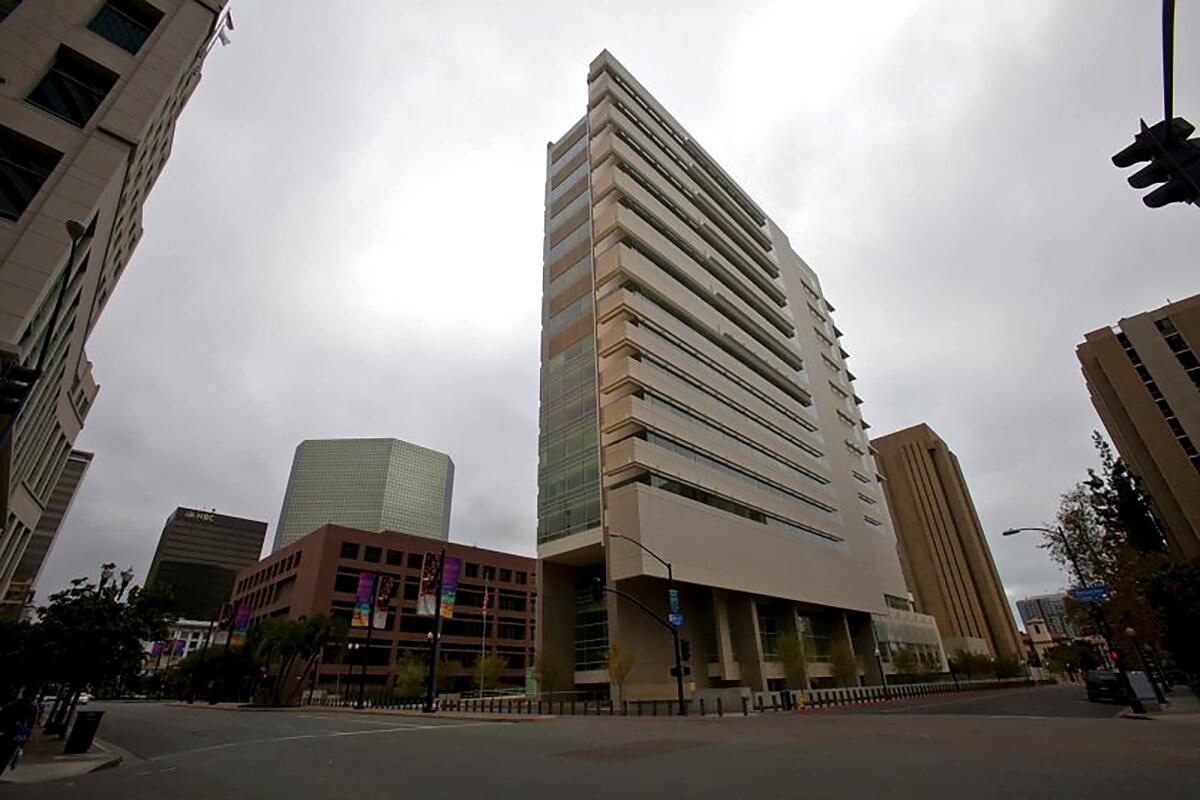Federal judge denies church’s bid to hold Easter service despite coronavirus stay-home orders

- Share via
SAN DIEGO — A federal judge declined on Friday to allow a small Campo-based Christian church to assemble for Easter services on Sunday, turning aside a lawsuit the church had filed against San Diego County that alleged the public health orders banning group gatherings discriminated against religion.
U.S. District Judge Cynthia Bashant turned down the request for a temporary restraining order against the county from Abiding Place Ministries. The church had filed a suit Thursday contending the public health order issued Wednesday that banned public or private gatherings of more than one person was unconstitutional and too broad, violating the religious freedom of the church.
The county’s order, the latest in a series aimed at combating the COVID-19 epidemic, said all gatherings were banned with exceptions for gathering of a single family or household, essential businesses, and public spaces where people are in transit and can maintain social distancing.
In the suit, the church argued that the order specifically prohibited religious gatherings but “allows gatherings for a multitude of businesses and activities that are not constitutionally protected, only requiring them to enact social distancing and increased sanitation standards. However, it does not allow a Church, which is protected by the First Amendment of the Constitution, to gather, even if it enacts the strictest possible social distancing and the highest possible sanitation standards.”
Jeremiah Graham, the lawyer for the church and a member, said Bashant turned down the suit by concluding the government had an overriding interest in protecting public health that in this instance justified the limits on religious gatherings, and that the order was not unconstitutional.
In constitutional law, individual rights can be overcome only if the government passes a high bar by showing there is a compelling state interest that justifies infringing on fundamental rights.
Graham said the church was uncertain if it would appeal. And he said that the church fully intended to abide by the ruling, and is planning to conduct services online Sunday.
Mike Workman, a county spokesman, said the county welcomed the ruling. “The judge upheld the countywide stay at home order,” he said in an email. “The order and this ruling are intended to protect the public health. We applaud the efforts of the local faith community who are reaching out to connect with their congregations via technology.”
Graham said the church had tried to work with county officials to hold a service, even proposing allowing people to gather but stay in their vehicles. But he said the county was adamant that if they gathered they would be in violation of the order, which could result in a misdemeanor charge and fines.
In court papers, county lawyers said the church was not being singled out, and that the order is a “necessary and critical tool to avoid a public health catastrophe.” The county said the order is widely applied across the county and does not target the free exercise of religion.
“The County’s stay-at-home order applies generally countywide, and has required the temporary closure of myriad businesses, events, and areas where people gather, without respect to the secular or religious nature of any such establishment or gathering,” county lawyers wrote.
They said those businesses that remain open do so because they have been designated “essential businesses” under state law, and must still abide by social-distancing and other measures designed to halt the spread of the coronavirus.
Moreover the county said that the church has been violating the gathering bans the last two Sundays.
In court papers, Senior Deputy County Counsel Timothy White wrote on March 29 there were 50 to 60 church members gathered at the Campo property for a service, seated two to three feet apart — less than the required six-foot separation called for under social-distancing rules. A deputy responded to complaints from residents. The deputy issued a warning but the service continued, White wrote.
The following Sunday a second deputy went to the church location to find Graham telling parishioners who arrived to remain in their cars to hear a broadcast of the service. The deputy left and then returned three hours later to find six to seven people standing together, but they quickly dispersed.
Since the stay-home orders, nearly all religious services for a variety of faith traditions have been disrupted, with most places of worship shutting down to public access and conducting services online via streaming feeds on Facebook or other platforms.
Graham said Abiding Place Ministries was not looking for special treatment — “Other churches should be able to have an assembly, if needed,” he said — but said the act of gathering together was a central tenant of the church’s practice and theology.
The hearing on the restraining order was conducted via telephone, according to an entry in the online case file, and the reasons for denying the restraining order were not spelled out. An entry referred to “the reasons stated in the telephonic hearing.”
Moran writes for the San Diego Union-Tribune.
More to Read
Sign up for Essential California
The most important California stories and recommendations in your inbox every morning.
You may occasionally receive promotional content from the Los Angeles Times.













